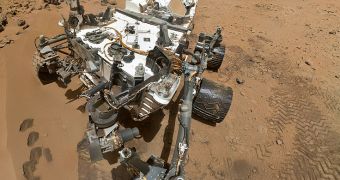For all the advances, space exploration still largely relies on Cold War era technology and resources. And that's not just the Soyuz capsule, first launched in 1967 and currently the only thing capable of carrying astronauts up to the International Space Station, it's also the fuel that powers most deep-space exploration missions, plutonium 238.
Plutonium 238 is the only reliable energy source that can last for decades. It's what powers the Voyager probes, still going strong after 36 years in space, and what made it possible for the Voyager 1 to leave the solar system and still send back valuable data.
It's also what powers the Curiosity rover currently investigating Mars' distant and wet past. But there is a problem: plutonium 238 is running out and no one is making any more. A byproduct of Cold War era nuclear weapon programs, the US, for example, hasn't made any plutonium 238 for more than two decades.
Wired goes into detail on the plutonium crisis that NASA is facing. At the time, it's estimated that the US has about 36 pounds of plutonium 238 for scientific research. The Curiosity rover, for example, uses 10 pounds in its batteries. Any serious exploration mission will need similar amounts or more, with current battery technology.
The problem is, there is no more. The US has only recently started creating new plutonium 238, experimentally, and in small quantities, a few micrograms. But even going at full production, the US could only create some 3.3 pounds of plutonium 238 in five to seven years, not nearly enough to satisfy the need.
This is why NASA is working on new battery technologies that would require less plutonium than current designs. For example, one design uses a Stirling thermodynamic cycle to extract electricity out of the radioactive plutonium 238. This process is several times more efficient than the current batteries, but it involves moving parts, something scientists aren't too happy about, concerned that the motion could interfere with the sensitive instruments aboard most probes.

 14 DAY TRIAL //
14 DAY TRIAL //